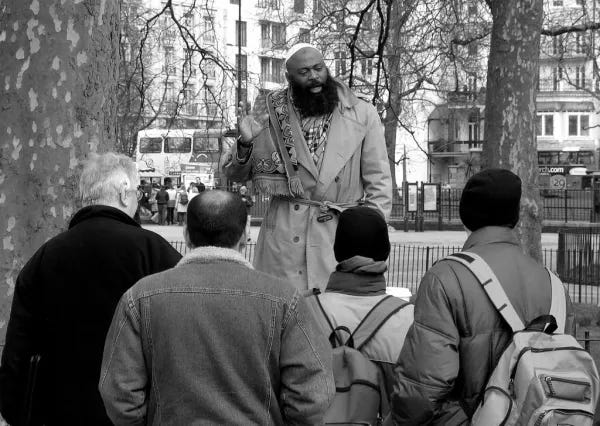Converting or Uncovering?
(Above: A Muslim preacher at Speakers Corner, London)
Internet posting, lectures in different arenas, distributing books on the street, seminars at colleges and universities… in many different ways we are presenting this ancient spiritual tradition of the East. People sometimes wonder whether our sole purpose in life is simply to convert others to our spiritual tradition. Admittedly, religious practitioners are renowned for their zealous endeavours to convince others. It can be a little off-putting to say the least, and in some cases even bordering scary. So why the big emphasis on ‘preaching’ for want of a better word?
Knowledge brings a certain responsibility. Morally, ethically and even legally, possession of some knowledge obliges us to act in a certain way. If you are a cardiologist and someone collapses from a heart attack in the street you would be required to do something. So in certain circumstances, to withhold information would be to act immorally. Of course, this doesn’t give us the free licence to sermonise everyone we meet so we can ‘save their soul’ there and then. Neither would we want such a licence. More than converting, as monks we are concerned with uncovering. The spiritual tradition is not an artificial imposition on one’s character, but rather the awakening of the original spiritual nature that is within everyone.
The poet Dunn writes in one passage that “no man is a social island”. As we live in a social context, everybody invariably impresses their ideas, values and ideologies upon those around them, and thus in one sense everyone is preaching. We can recognize the spirituality everywhere, in all traditions. At the same time, we feel we have a powerful spiritual process that is extremely practical and relevant to the world we live in. Our duty is to present this information, and then allow people to make their own judgements on what they can and can’t do.



Very beautifully expressed, thank you for this. When seen in this manner—as a duty some bear to generously share their growing spiritual knowledge—it casts a very different light on it, especially for people who may be far less ready to receive.
Shorn of all its modern day connotations (sometimes negative, often humorous), evangelism viewed thus literally takes it back to its etymological roots: the work of a “divine messenger”.
As one of the friends mentioned in the comment below (possibly even the first!) I found this to be a very helpful reminder.
Pranaams and gratitude.🙏🏽
Pranams Swami! Very useful article for me especially because a few of my friends call me an Evangelist! This approach is beautiful! Harekrishna Maharaj!